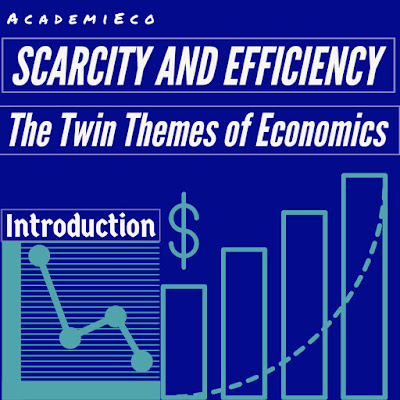- Get link
- X
- Other Apps
by
Shahriar
- Get link
- X
- Other Apps
SCARCITY AND EFFICIENCY
If we think about the definition, we find two key ideas that run through all of economics: that goods are scarce and that society must use its resources efficiently. Indeed, the concerns of economics will not go away because of the fact of scarcity and the desire for efficiency.
 |
| Image created by Author |
Consider a world without scarcity. If infinite quantities of every good could be produced or if human desires were fully satisfied, what would be the consequences? People would not worry about stretching out their limited incomes because they could have everything they wanted; businesses would not need to fret over the cost of labor or health care; governments would not need to struggle over taxes or spending or pollution because nobody would care. Moreover, since all of us could have as much as we pleased, no one would be concerned about the distribution of incomes among different people or classes.
In such an Eden of affluence, all goods would be free, like sand in the desert or seawater at the beach. All prices would be zero, and markets would be unnecessary. Indeed, economics would no longer be a useful subject.
But no society has reached a utopia of limitless possibilities. Ours is a world of Scarcity, full of economic goods. A situation of scarcity is one in which goods are limited relative to desires. An objective observer would have to agree that, even after two centuries of rapid economic growth, production in the United States is simply not high enough to meet everyone's desires. If you add up all the wants, you quickly find that there are simply not enough goods and services to satisfy even a small fraction of everyone's consumption desires. Our national output would have to be many times larger before the average American could live at the level of the average doctor or major-league baseball player. Moreover, outside the United States, particularly in Africa, hundreds of millions of people suffer from hunger and material deprivation.
Given unlimited wants, an economy must make the best use of its limited resources. That brings us to the critical notion of efficiency. Efficiency denotes the most effective use of society's resources in satisfying people's wants and needs. By contrast, consider an economy with unchecked monopolies or unhealthy pollution, or government corruption. Such an economy may produce less than would be possible without these factors, or it may produce a distorted bundle of goods that leaves consumers worse off than they otherwise could be- either situation is an inefficient allocation of resources.
Economic efficiency requires that an economy produce the highest combination of quantity and quality of goods and services given its technology and scarce resources. An economy is producing efficiently when no individual's economic welfare can be improved unless someone else is made worse off.
The essence of economics is to acknowledge the reality of scarcity and then figure out how to organize society in a way that produces the most efficient use of resources. That is where economics makes its unique contribution.
If you found this article useful then please comment below and let me know about it.😊😊😊
Comments
Post a Comment